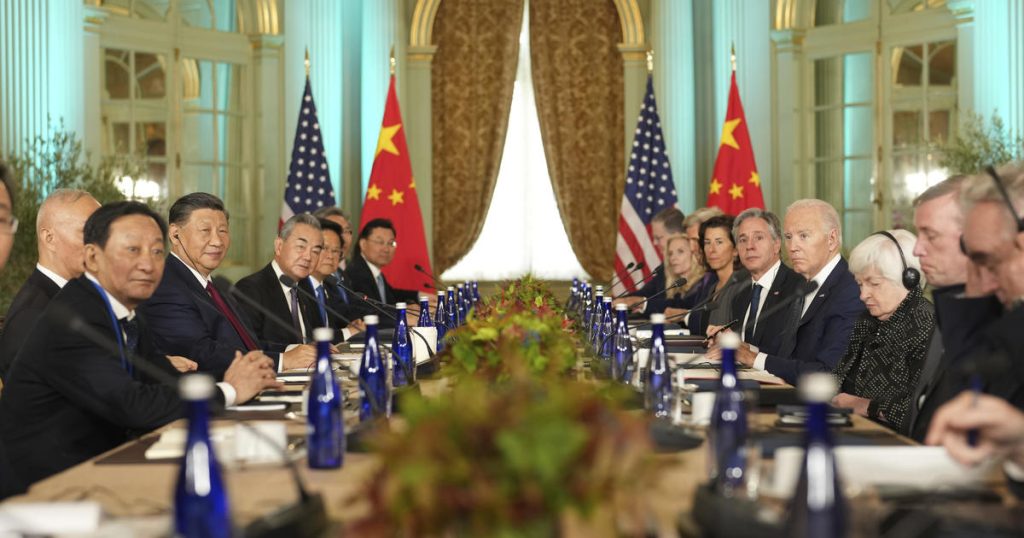President Biden is campaigning in Pennsylvania and advocating for the tripling of tariffs on Chinese steel and aluminum imports to protect the U.S. steel and aluminum industry. At the U.S. Steelworkers headquarters in Pittsburgh, Biden is urging the U.S. trade representative to raise the existing 7.5% tariff rate on Chinese imports. The White House claims that American workers face unfair competition from Chinese imports that are artificially low-priced and have higher emissions. The administration is also pursuing anti-dumping investigations against countries saturating markets with Chinese steel and working with Mexico to prevent Chinese companies from avoiding tariffs by shipping through Mexico. Additionally, an investigation into China’s practices in maritime, shipbuilding, and logistics sectors is being launched.
Amidst this effort, the planned sale of U.S. Steel to Japanese-owned Nippon Steel is strongly opposed by President Biden. His campaign is launching a six-figure, five-day ad blitz highlighting his pro-labor stances during his three-day swing through Scranton, Pittsburgh, and Philadelphia. Pennsylvania is a battleground state in the upcoming election, with former President Trump and Biden neck-and-neck in polls. Biden compared “Scranton values” to “Mar-a-Lago values,” referencing Trump’s Florida resort, and emphasized the competing visions for the economy as fundamental fairness issues at the heart of his campaign.
The proposed tariffs on Chinese steel and aluminum imports aim to address unfair competition faced by American workers and protect the U.S. steel and aluminum industry from artificially low-priced Chinese alternatives. The Biden administration’s efforts include anti-dumping investigations against countries flooding markets with Chinese steel and collaboration with Mexico to prevent tariff avoidance through shipping steel there first. An investigation into China’s practices in maritime, shipbuilding, and logistics sectors is also part of the government’s strategy to ensure fair competition and protect U.S. industries.
President Biden’s opposition to the planned sale of U.S. Steel to Japanese-owned Nippon Steel reflects his commitment to supporting American industries and protecting domestic jobs. His campaign’s ad blitz highlights his pro-labor stances as he travels through key cities in Pennsylvania, a battleground state in the upcoming election. The competition between Biden’s emphasis on “Scranton values” and Trump’s “Mar-a-Lago values” underscores the differing visions for the economy and raises questions of fundamental fairness in economic policies. The close polling between Biden and Trump in Pennsylvania indicates the state’s importance in the election and the significance of these economic issues to voters.
The focus on tariffs on Chinese imports and anti-dumping investigations is part of a broader strategy by the Biden administration to address unfair trade practices and protect American industries. By tripling tariffs on Chinese steel and aluminum imports, the administration aims to level the playing field for U.S. workers and prevent undercutting of high-quality American products by artificially low-priced imports. The investigation into China’s practices in various sectors further demonstrates the government’s commitment to ensuring fair competition and safeguarding U.S. industries from predatory practices. These efforts are part of Biden’s broader economic agenda to promote domestic manufacturing, protect workers, and create a level playing field for American businesses in the global market.
As President Biden continues his campaign in Pennsylvania and emphasizes his pro-labor stances, the contrast between his economic vision and that of former President Trump is highlighted. Biden’s push for tariffs, anti-dumping investigations, and protection of American industries underscores his commitment to supporting domestic manufacturing and ensuring fair competition. The battleground status of Pennsylvania in the upcoming election adds significance to these economic issues, as voters weigh the competing visions for the economy and the impact on their livelihoods. Biden’s messaging around fundamental fairness in economic policies resonates with voters and sets the stage for a critical debate on trade, jobs, and industry in the lead-up to the election.


